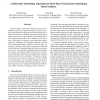Free Online Productivity Tools
i2Speak
i2Symbol
i2OCR
iTex2Img
iWeb2Print
iWeb2Shot
i2Type
iPdf2Split
iPdf2Merge
i2Bopomofo
i2Arabic
i2Style
i2Image
i2PDF
iLatex2Rtf
Sci2ools
116
click to vote
RTSS
2005
IEEE
2005
IEEE
A Deferrable Scheduling Algorithm for Real-Time Transactions Maintaining Data Freshness
Periodic update transaction model has been used to maintain freshness (or temporal validity) of real-time data. Period and deadline assignment has been the main focus in the past studies such as the More-Less scheme [22] in which update transactions are guaranteed by the Deadline Monotonic scheduling algorithm [13] to complete by their deadlines. In this paper, we propose a novel algorithm, namely deferrable scheduling, for minimizing imposed workload while maintaining temporal validity of real-time data. In contrast to previous work, update transactions scheduled by the deferrable scheduling algorithm follow a sporadic task model. The deferrable scheduling algorithm exploits the semantics of temporal validity constraint of real-time data by judiciously deferring the sampling times of update transaction jobs as late as possible. We present a theoretical analysis of its processor utilization, which is verified in our experiments. Our experimental results also demonstrate that the defe...
Applied Computing | Deferrable Scheduling Algorithm | RTSS 2005 | Scheduling Algorithm | Update Transaction |
Related Content
| Added | 25 Jun 2010 |
| Updated | 25 Jun 2010 |
| Type | Conference |
| Year | 2005 |
| Where | RTSS |
| Authors | Ming Xiong, Song Han, Kam-yiu Lam |
Comments (0)

